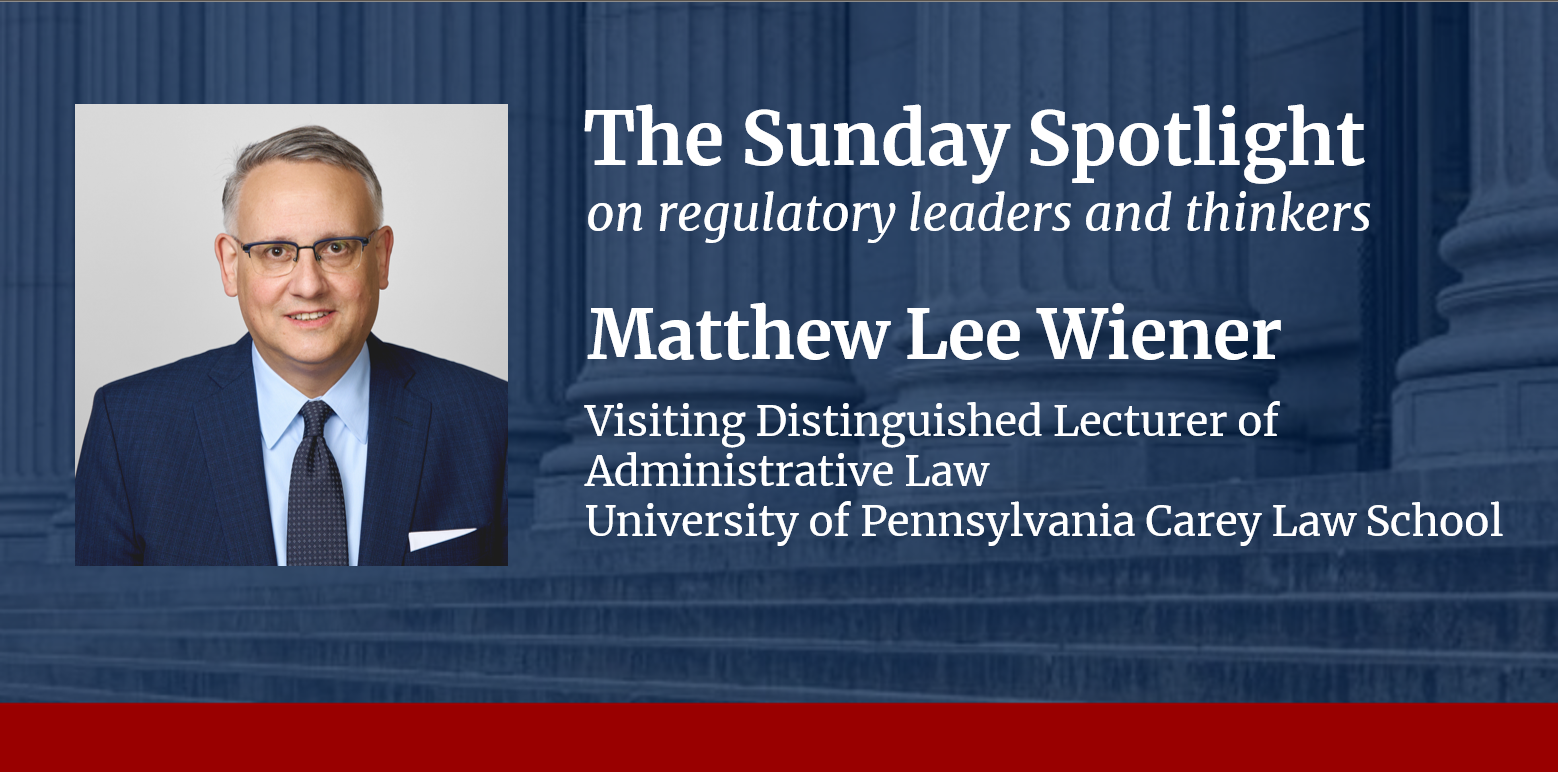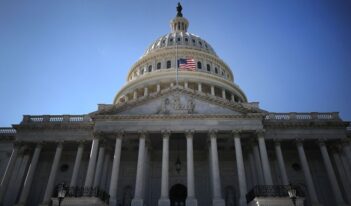
Matthew Lee Wiener discusses his career in public service and current challenges facing the administrative state.
In a conversation with The Regulatory Review, Matthew Lee Wiener reflects on the challenges facing administrative law, drawing on his decades of leadership at the intersection of regulatory law and federal policy.
Recent decisions from the U.S. Supreme Court have placed administrative law in the public eye. As these developments unfold, Wiener encourages attention to areas of agency practice that operate largely beyond the courts’ reach, explaining that “much administrative law, thankfully, lies outside” their purview. In doing so, he cautions against “overgeneralizing” the administrative state and emphasizes that the best understanding requires attention to the unique structures and processes of agency programs.
One such process is administrative adjudication, which Wiener identifies as a crucial—yet often overlooked—component of agency practice and source of administrative law. Although the Administrative Procedure Act (APA) offers general principles to guide administrative adjudication, Wiener notes that agencies determine most adjudicatory rules and structures with minimal oversight from the U.S. Congress or the judiciary. Discussing challenges that have threatened the advancement of agency practices, he highlights the unique role of the Administrative Conference of the United States (ACUS) in directing reform across agency functions, including issuing recommendations to improve agency adjudication, enhancing transparency, and offering “a consensus-based blueprint” for agency use of guidance documents.
Although observing that civil servants have been “disempowered” by executive actions, Wiener encourages law students and early-career lawyers interested in public service to connect with government officials, make use of alumni networks, and prepare to take risks.
Wiener is one of the nation’s leading experts on administrative law and agency reform. Currently, he is a visiting distinguished lecturer of administrative law at the University of Pennsylvania Carey Law School, where he serves as the faculty advisor of The Regulatory Review alongside Professor Cary Coglianese.
Before arriving at Penn Carey Law, Wiener served as the acting chair, vice chair, and executive director of ACUS. He has continued his work with ACUS as a special counsel, research consultant, and co-chair of its Council on Federal Administrative Adjudication. Wiener was recently elected as the vice chair and future chair-designee of the American Bar Association’s (ABA) Section of Administrative Law and Regulatory Practice.
The Regulatory Review is pleased to share the following conversation with Matthew Lee Wiener.
The Regulatory Review: What drew you to devoting a substantial part of your career to public service?
Altruistic considerations aside, I wanted to work on a much broader range of issues than private practice, where I happily spent the first decade of my career, allowed. My first position in government service—as a counsel to the U.S. House of Representatives Judiciary Committee and its administrative law subcommittee—brought me into contact with a diverse array of issues involving the federal courts, civil justice reform, international litigation, presidential powers, and administrative agencies. It was a formative experience. I was surprised and pleased to read in an interview with Professor Kate Shaw of the University of Pennsylvania Carey Law School that the late Justice John Paul Stevens reported a similar experience working for the Committee early in his career.
Another draw of public service was the opportunity to work with so many people of diverse backgrounds, perspectives, ideologies, and professional affiliations whom I never would have encountered in private practice. They included several members of the Penn Law faculty.
One thing that did not draw me to public service was the desire to maximize my leisure time. Too often, I hear young lawyers say that they chose government service to achieve “work–life balance”—a terrible phrase that, insofar as it’s even coherent, devalues work. Serious public service requires a serious commitment of time.
TRR: How has your experience as acting chair, vice chair, and executive director of ACUS informed your perspective on the administrative state?
It made me realize, much more than I previously did, that most administrative law comes from agencies and the White House, not from the courts and certainly not from the U.S. Congress. Students who take administrative law in law school—or any other public law course—may not realize that. Public law courses usually look at agency processes from the perspective of a reviewing court, which I recognize also serves valid pedagogical needs.
Much administrative law, thankfully, lies outside the purview of courts, which isn’t to deny an important role for courts in policing the boundaries of agency authority and requiring that agencies engage in so-called reasoned decision-making. The APA, though it includes some specific rules, mostly comprises general principles, and they hardly cover the whole field. Agencies must decide how to apply the APA’s general principles and fill in its many gaps. This is especially true for administrative adjudication, little of which today is meaningfully governed by the APA. Agencies design most adjudicatory rules and structures themselves, subject to little judicial or congressional oversight.
My work at ACUS also taught me about the perils of generalizing—or overgeneralizing—about the administrative state. You must immerse yourself in the structures and practices of particular agency programs if you are to understand the administrative state. Many commentators, including some academics, come to the subject wielding crude generalizations that betray their unfamiliarity with how things actually work at agencies. I’m afraid that the Supreme Court sometimes does so itself. Some of its justices have relied on distressingly ungrounded generalizations about the threat to constitutional norms posed by regulatory agencies.
TRR: What do you view as some of ACUS’s most innovative or important contributions to administrative law reform during your tenure?
Three groups of recommendations come to mind—if I must choose. The first are those directed to improving agency adjudication. Neither Congress nor the White House gives much attention to adjudication, as opposed to rulemaking. ACUS has stepped into this space by identifying best practices to make adjudication more fair—more consonant with due process norms—and efficient. The second are ACUS recommendations directed to enhancing transparency, by which I mean public access to agency law, especially the sub-regulatory law that doesn’t appear in the Code of Federal Regulations. And the third are ACUS recommendations concerning guidance documents—non-binding agency rules that inform the public and lower-level agency officials how agencies will exercise their discretion or interpret statutes and regulations. Guidance documents have been controversial for decades. Critics charge that they are de facto regulations—issued without observing APA rulemaking procedures—because regulated parties have no real choice but to follow them. ACUS has offered a consensus-based blueprint for how agencies can use guidance documents for the public’s and their own benefit without treating them as binding or unchallengeable. The first Trump Administration, to its credit, largely aligned its directives on guidance with ACUS’s recommendations—and otherwise worked admirably well with ACUS.
Just as important as ACUS recommendations, but less visible, is what is sometimes called ACUS’s informal work. This work takes two main forms. First, ACUS publishes reports, sourcebooks, model procedural rules, and so forth that help agencies—and sometimes Congress—design new administrative programs and evaluate existing ones. During my tenure, ACUS undertook major studies on, among other things, the use of artificial intelligence in regulatory programs, the hundreds of statutes governing judicial review of agency action, and nationwide injunctions and federal regulatory programs.
Second, ACUS brings agency officials together to exchange information about their administrative programs. Agency officials learn about best practices from their counterparts at other agencies. During my tenure, ACUS enhanced its information-exchange activities, including by establishing its Council on Federal Administrative Adjudication, which I co-chair. No other agency does—or can do—this work.
TRR: In recent years, have agencies faced challenges in implementing ACUS recommendations to improve agency adjudication? If so, what have been the biggest challenges?
The challenges in implementing recommendations concerning adjudication are probably the same as the challenges that arise in implementing all recommendations, and they are not, for the most part, new challenges. They have been around since ACUS first opened its doors in 1968.
Most agencies resist change—career bureaucrats, an often unfairly maligned lot, especially so—for any number of reasons, including simple risk aversion, and bureaucratic structures over which agency officials who design administrative procedures have little control sometimes make change difficult. Another problem—this one continuing to worsen—is that many agencies are underfunded.
Despite these challenges, ACUS has achieved a remarkable record in getting its recommendations implemented, especially given the small size of its staff. The main reason is that agencies have already bought into recommendations before they’re issued—having participated in drafting them and then approving them—and they perceive the recommendations as helping them to do their work more efficiently and fairly.
I’d like to emphasize one related point: As Adrian Vermeule and others have observed, agencies often design administrative procedures in ways that serve the public interest well, whatever their motives for doing so. Agencies do not, contrary to an all-too-common assumption, seek to provide only the minimal procedural protections necessary to satisfy the demands of judicial review.
TRR: Overall, what are the main challenges you see to advancing administrative law reform in today’s environment in Washington, D.C.?
In short, extreme political polarization and rancorous partisanship.
Courts aside, reform can come from three entities—the White House, agencies, and Congress. Within the executive branch, the President and White House offices may be best positioned to advance the largest-scale, cross-cutting reforms through presidential directives and guidance from the Office of Management and Budget. We’ve seen the last several administrations undertake significant reform initiatives. The problem is that many of these initiatives have had no bipartisan support. They’ve served avowedly partisan interests, even if they’ve had the patina of neutrality. The Trump Administration rescinded many of the Biden Administration’s executive directives, and the next Democratic administration will follow suit.
As for agencies, they must rely on civil servants to undertake much of the low-profile procedural reform so critical to administrative justice. My sense is that the current Administration has largely disempowered civil servants from undertaking this work. More generally, I doubt that most agencies in this Administration will show much interest in administrative-law reform that transcends narrowly partisan and ideological interests. This Administration often seems uncommitted to the processes and procedures that we associate with administrative justice and the rule of law—which isn’t to say that proceduralism should occupy every domain of government decision-making. But it’s early in the Administration, and I reserve judgment.
Of course, some important reforms must come from Congress. Only Congress, for example, can clean up the exceedingly messy corpus of laws governing judicial review of administrative action—which, by the way, it has seldom attempted to do—or modernize the APA. But, as I needn’t tell TRR readers, Congress doesn’t do much legislating these days—actually, it hasn’t done much legislating for a while—and partisan divisions would make reform difficult in any case. Almost none of the last decade’s administrative-law reform legislation has been bipartisan. Nearly all of it has come from Republicans. Democrats have largely assumed a reactive posture.
Congressional reform has always been difficult. Congress has barely touched the APA since it was enacted in the 1940s. The notable exception is amending the APA’s public-disclosure provisions. When Congress has attended to administrative-law reform, it has addressed particular agency programs—to achieve substantive outcomes—rather than cross-agency or general processes. Then-Professor Antonin Scalia made a similar point in the late 1970s when he raised concerns about the “balkanization” of administrative law that characterized procedural reform in Congress.
TRR: What advice would you give to a law student or young lawyer today seeking to launch a career in public service?
Whenever I’m asked to give advice to students and new lawyers, I often begin by giving some advice about advice. I say, only half-jokingly, “don’t take advice—especially unsolicited advice.” My point is to be careful about what advice you take and from whom you take it. People tend to generalize from—and understandably exalt—their own career paths. Those paths were often the result of happenstance, and so you can’t replicate them, even if you wanted to. So my own overarching advice—unsatisfying as it may be—is to chart your own path.
That said, I can offer a few suggestions that students and new lawyers may find useful:
- If you’re in law school, take public law courses in the subjects that interest you.
- Get involved in professional organizations that will bring you into contact with government lawyers.
- Talk with as many government officials as you can—to make contacts that may serve you now or in the future, identify potential job opportunities, and learn how hiring processes work. Start with alumni at your school. Penn Carey Law students are especially lucky to have so many alumni on whom to draw.
- Work at an agency one summer during law school or intern with an agency—even part-time—during the school year.
- Be prepared to take risks. Taking risks might mean, for instance, leaving a stable and well-paid law firm job to take a government job that may not be your first choice or may not put you on an obvious career path. You may open unexpected doors for yourself.
- Be patient, and don’t despair if things don’t go your way at first. Your first job—or even your second or third—doesn’t put you on an unalterable trajectory. You can often make changes—even dramatic changes—as you proceed through your career.
- If you spend time in the private sector, save as much money as your circumstances allow. That will allow you to take an otherwise unaffordable job that may get you in the door.
I’ll end with a necessary final observation that bows to today’s reality: Civil service jobs in the federal government are now scarce. You may need to await a new administration to enter federal service. Or think about jobs in state or municipal governments. Now, if you support this Administration’s policies, then by all means, consider taking a non-career or political position.
TRR: How can scholars and practitioners at the early stages of their career become more engaged members of the administrative law community?
Not all legal fields have an associated community. You wouldn’t speak, say, of a “litigation community.” But yes, as your question recognizes, there is an administrative law community—or maybe I should say communities.
The most visible such community and the one I know best comprises the lawyers who work at federal agencies, administrative law professors, and lawyers at firms who represent clients before agencies and challenge their actions in court—although law-firm practitioners, unfortunately, are less well-represented than they once were, and public interest lawyers have never been well represented. This community is easy to access.
An obvious entry point is the ABA’s Section of Administrative Law and Regulatory Practice, which may be the most ideologically and professionally diverse section of the ABA, even if it is not as diverse as it could be. The Section offers abundant opportunities for students and lawyers. Consider also the administrative law arms of state and local bar associations, such as the D.C. Bar. We too often forget that administrative law is practiced at the state and local level. Finally, attend in person some of the many programs—academic and otherwise—in which you can expose yourself to administrative law and meet its practitioners and scholars.
Law students and new lawyers will find that the administrative law community is welcoming and collegial—and, most importantly, open to serious dialogue about the best way to order the administrative state. When people of different perspectives on administrative power leave their political talking points at the door, they can often reach consensus on general principles of administrative governance. We should not forget that the APA, as Justice Robert Jackson famously remarked, was the result of compromise.
There are signs, to be sure, that consensus may be breaking down—in part, I hate to say, the result of opposition to the administrative state from the political right—and administrative law discourse has sometimes become debased in recent years. But I maintain hope that the collegiality and non-partisanship that have long characterized the administrative law community will persist well into the future.



